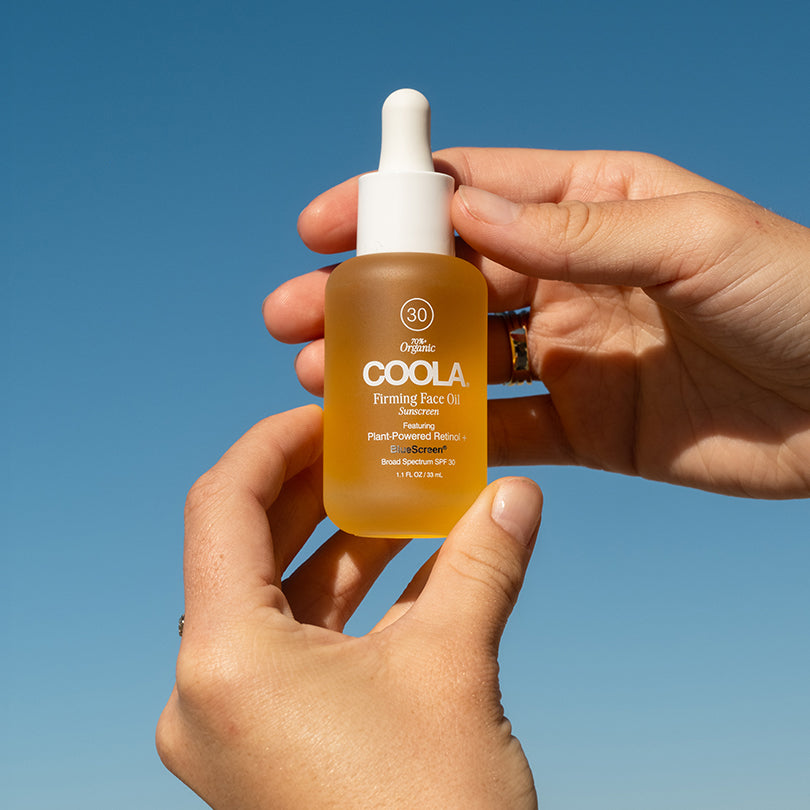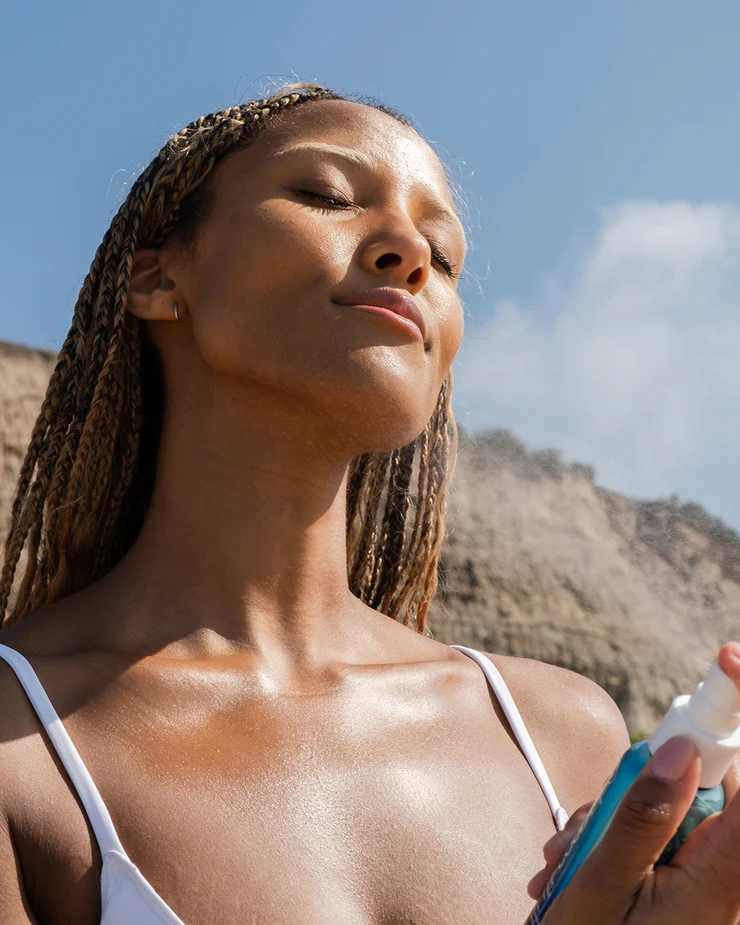If you've ever wondered about those pesky dark spots or how to prevent them from showing up in the first place, you've come to the right place. Here, we'll discuss all things hyperpigmentation: what it is, what causes it, and the powerful impact of organic face sunscreen in the battle against skin discoloration.
What Is Hyperpigmentation?
So, what is hyperpigmentation on the face, or any part of the body, for that matter? Let's start at the beginning. Hyperpigmentation refers to areas of the skin that appear darker than the surrounding skin as a result of increased melanin production. These dark spots can occur anywhere on the body, but they are particularly bothersome when they show up on our faces.
Hyperpigmentation comes in different forms, such as age spots, melasma, and post-inflammatory hyperpigmentation (PIH). Each type has its own characteristics and triggers, but they all have one thing in common: they can dampen our confidence and hinder our journey towards healthy looking skin.
What Causes Hyperpigmentation?
Various factors can trigger hyperpigmentation, and some of them might surprise you.
1. Sun Exposure: Our favourite source of warmth can also be a cause of pesky dark spots. UV rays trigger the production of melanin, which acts as our skin's natural defence against the sun's harmful effects. However, an excessive amount of melanin can lead to dark spots, especially in areas exposed to the sun.
2. Hormonal Changes: Hormonal imbalances, whether due to pregnancy, birth control pills, or menopause, can mess with our melanin production and give rise to melasma, commonly known as "the mask of pregnancy."
3. Skin Inflammation: When our skin is injured or inflamed (think acne, eczema, or even a cut), it produces more melanin as part of the healing process. Unfortunately, this can leave us with lingering dark spots known as post-inflammatory hyperpigmentation (PIH).
4.Genetics: Sometimes, our genes play a role in determining our susceptibility to hyperpigmentation. Thanks, ancestors!
Does Sunscreen Help With Hyperpigmentation?
Absolutely. Sunscreen is your skin's defense when it comes to sun protection and fighting hyperpigmentation. In addition to protecting your skin from harmful UV rays, sunscreen also prevents those dark spots from barging in uninvited.
The Importance of Sunscreen in Preventing Hyperpigmentation
Picture this: you're basking in the warm sun, but your skin is safely shielded by a layer of sunscreen. Those harmful UV rays are blocked from stimulating excessive melanin production, sparing you from potential spots.
Role of Sunscreen in Managing Existing Hyperpigmentation
Sunscreen doesn't just prevent hyperpigmentation; it can also help to treat it! If you've already got some dark spots on your skin, fear not. Sunscreen can help fade them over time, restoring an even complexion.
UV Protection and Its Impact on Skin Pigmentation
Let's take a look at the fascinating science of how UV rays interact with your skin. When rays from the sun meet your skin, they trigger a cascade of events that can lead to hyperpigmentation. UV rays trigger an increase in melanin production, your skin's natural defense mechanism against the sun's harmful effects. While melanin is here to protect you, too much of it can cause those dark spots we know all too well.
This is where broad-spectrum sunscreen comes in to save the day. Broad-spectrum sunscreen acts like a shield, blocking both UVA and UVB rays from penetrating your skin. By doing so, it prevents the overproduction of melanin, ensuring that those pesky dark spots don't find their way onto your complexion.
What Helps With Hyperpigmentation?
Managing hyperpigmentation is no one-size-fits-all deal; it requires a multi-faceted approach.
Skincare Treatments for Hyperpigmentation
When it comes to combating dark spots, there are a few powerful options available. From gentle topical treatments that fade discoloration over time to more intensive professional procedures that target deep-seated pigmentation, there’s something for everyone.
Role of Sunscreen in a Comprehensive Skincare Routine
Rain or shine, summer or winter, sunscreen is your skin's best friend. As we've already learned, sunscreen plays a pivotal role in preventing and managing hyperpigmentation. It's not just a seasonal accessory; it's a year-round, non-negotiable part of your skincare routine if you're serious about keeping those spots at bay.
Tips for Preventing and Managing Hyperpigmentation
Knowledge is power, and we're here to equip you with practical tips and lifestyle changes to take control of your skin's destiny. By adopting these habits, you can reduce the chances of new dark spots popping up and keep existing ones in check. Here are some tips to help you on your journey to radiant skin:
- Daily Sunscreen: Apply a broad-spectrum sunscreen with at least SPF 30 every single day, rain or shine, to shield your skin from UV rays. Plus, if you’re wondering does sunscreen help acne, studies show that using sunscreen does not worsen acne, and it confirmed that sunscreen is important for overall skin health and skin damage prevention.
- Seek Shade: When the sun is at its peak, seek shade or wear protective clothing, like wide-brimmed hats and UV-protective clothing.
-
Avoid Tanning Beds: Just say no to tanning beds! They may give you a temporary bronzed look, but they also increase your risk of hyperpigmentation, skin cancer, and wrinkles.
- Gentle Cleansing: Be kind to your skin with gentle cleansers that don't strip away its natural moisture.
- Exfoliate Wisely: Exfoliation can help slough off dead skin cells but don't overdo it. Opt for gentle exfoliants and limit the frequency to avoid irritation.
- Topical Treatments: Incorporate skincare products with ingredients like vitamin C, niacinamide, and retinoids to target hyperpigmentation.
- Stay Hydrated: Hydrated skin is happy skin! Drink lots of water throughout the day to maintain your skin's natural moisture.
- Healthy Diet: Nourish your skin from within by including a variety of fruits, vegetables, and antioxidants in your diet.
- Manage Stress: Stress can trigger hormonal imbalances that may contribute to hyperpigmentation. Practice relaxation techniques to keep stress in check.
- Avoid Picking or Squeezing: Though tempting, resist the urge to pick or squeeze blemishes, as it can lead to post-inflammatory hyperpigmentation.
- Consult a Dermatologist: If you have persistent or severe hyperpigmentation, consult a dermatologist for personalized treatment options.
By following these tips and making them a part of your daily skincare routine, you can take charge of your skin's health and maintain a radiant, even complexion. Remember, prevention is key, and with the right skincare practices and the support of sunscreen, you'll be well on your way to a future with fewer dark spots and more confidence.
Embrace SPF for Your Healthiest Possible Skin
There you have it, the lowdown on hyperpigmentation and the powers of sunscreen! Armed with this knowledge, you can confidently take charge of your skin's health and help it looks its very best. Remember, wearing sunscreen is more than just a summertime essential; it's a year-round commitment to protecting and nurturing your skin.



